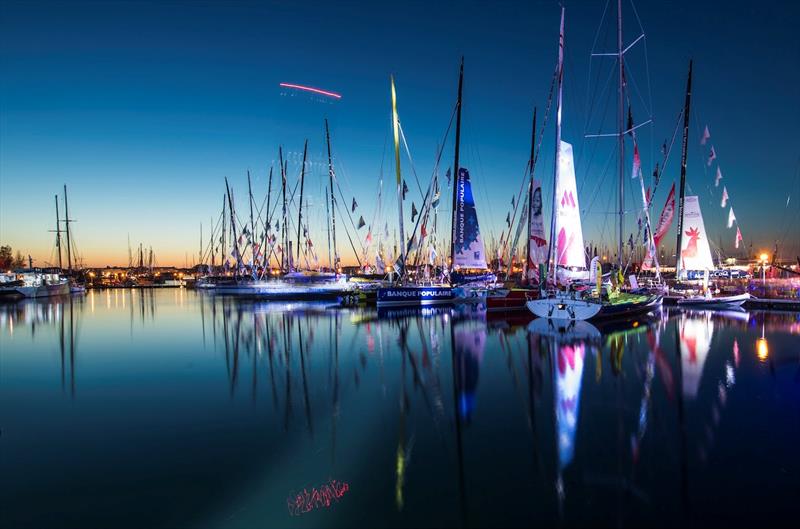
The incomparable Vendée Globe
by Mark Jardine 26 Oct 2020 15:00 PDT

Eve of the Vendée Globe 2016/17 start © Vincent Curutchet / DPPI / Vendee Globe
For a race that only started in 1989, the Vendée Globe has reached iconic status in the intervening time. Taking place every four years, this is ocean racing in its purest form; single-handed, non-stop around the world in 60-foot monohulls conforming to the IMOCA box rule.
The 2020-21 edition start is now under two weeks away, on Sunday 8th November at just after midday GMT, and the excitement is immense. This is sailing's chance to steal the sporting limelight around the world.
For the French, the race has always been massive, not just amongst sailors, but the general public as well. In normal years, the start venue of Les Sables-d'Olonne welcomes up to two million visitors to the town and race village, but of course 2020 is not a normal year...
The race itself has grown massively and the technology involved in the boats has continually pushed the boundaries of offshore sailing. Inaugural winner Titouan Lamazou completed the course in 109 days and 8 hours, whereas Armel Le Cléac'h took just 74 days and 3 hours to finish in the 2016-17 edition.
The fleet size has also steadily increased. The inaugural race had thirteen entries, of which eight finished, although American Mike Plant disqualified himself after receiving minor assistance near New Zealand, making the official finishers count as seven. The 2016-17 race saw 29 skippers from ten countries with a record eighteen finishers, and this year there are 33 skippers lining up to take part.
Famously the race has only been won by Frenchmen with Alain Gautier, Michel Desjoyeaux (the only person to win the race twice), Vincent Riou, François Gabart and most recently Armel Le Cléac'h becoming sailing legends. The closest anyone has come to toppling the French domination is Alex Thomson finishing just 16 hours behind Le Cléac'h in the last edition, and Ellen MacArthur finishing second in the 2000-21 edition, a day behind Desjoyeaux.
When it comes to the technology involved in the boats, probably the most visible and marked change in recent years has been the addition of foils designed to lift the hull clear of the water. There is a key difference in the IMOCA class rule from what we see with the America's Cup AC75s or foiling dinghies such as the International Moth, in that the rudders aren't allowed any kind of T-foil, effectively restricting the foiling to reducing the wetted surface area of the boat with the stern usually in the water. Yes, we see occasional photos of boats fully 'launched', but this isn't their usual mode.
Life on board these boats has always been uncomfortable, but the latest generation of IMOCAs take this to a new level. In heavy seas the sailors are literally thrown around as the boat negotiates the waves. The open cockpits of previous years have moved steadily towards fully-enclosed designs, protecting the sailors from the elements. This is entirely necessary with speeds of up 40 knots now possible. Being hit by a cascade of water at these speeds is beyond dangerous.
An area which has seen a step-change in technology is autopilots. Gone are the days of a device simply keeping a constant heading. Modern autopilots manage how an IMOCA yacht navigates each wave, trying to maintain speeds at their optimum through day and night. These devices outperform humans and don't suffer from tiredness. They relentlessly push the boats to the limit as Sam Davies, skipper of Intitiatives Coeur describes in this excellent article on the subject by Matt Sheahan: "The pilot systems maintain an apparent wind angle and speeds that I hadn't dreamed of trying if I was steering - It makes for quite a violent ride at times."
As the apparent wind moves forward, sail design has changed considerably. Headsail options on roller-furlers limit the time sailors have to spend 'on deck' and mean most manoeuvres can be completed from inside the cockpit. The sails have to be designed to perform through a wide range of wind angles as constantly trimming the sails simply isn't an option single-handed in such powerful craft.
So, who will win the 2020-21 edition? The Vendée-Arctique-Les Sables d'Olonne provided a few pointers with Jérémie Beyou's Charal taking victory after a nip-and-tuck battle with Charlie Dalin on Apivia and Thomas Ruyant on LinkedOut. There's no doubt that this trio will be in the reckoning to win overall.
The next group in this race included Samantha Davies (Initiatives Coeur), Kevin Escoffier (PRB), Yannick Bestaven (Maitre CoQ IV) and Boris Herrmann (SeaExplorer-Yacht Club of Monaco) who also have fast, albeit older, designs.
Of those that suffered damage in the Vendée-Arctique, Sébastien Simon on Arkéa-Paprec, who broke his starboard foil, and Armel Tripon on L'Occitane en Provence are known to be fast.
The big unknown is Alex Thomson on Hugo Boss. Third in the 2012-13 edition and second in the 2016-17 race, will this finally be his chance to top the podium and finally end the domination of the French in this race? The boat itself looks the part, but actual racing time for Alex has been lacking. He certainly has the experience, and has overcome obstacles in the past, such as sailing almost the entire previous race with a broken foil, so maybe, just maybe, this will be his time.
The Vendée Globe has all the ingredients to be an absolute classic: incredibly fast and eye-catching yachts with the ability to transmit the experience of the sailors directly to us armchair sailors at a time when many of us are restricted in what we can do with our own sailing. On Sail-World.com and YachtsandYachting.com we will be bringing you updates in words, pictures and videos throughout the entire race and we're incredibly excited about how it unfolds!
Mark Jardine
Sail-World.com and YachtsandYachting.com Managing Editor